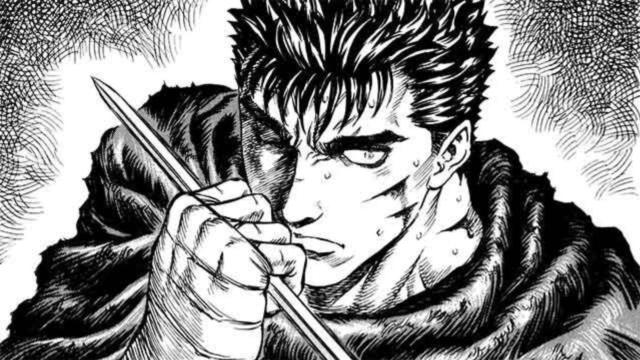It’s telling that the panel that sticks with me most from Berserk — a manga brimming with busy violence and morbid monstrosities — is one of quiet tranquillity.
Guts, the story’s hero, is sitting by himself on a wall, looking at the night’s sky, resting, alone. The panel is a placid exhalation punctuating a story that is perhaps better known for its darkness, trauma, and grief. It is a moment of rest in a story of action, a blip of peace, and an acknowledgement of what it means to be a survivor in a world that has dealt you so much pain.
Content warning: This story contains mentions of sexual assault.
I came to manga, and thus Berserk, relatively late. I discovered Kentaro Miura’s long-running masterpiece after a critic I like cited a song from Susumu Hirasawa’s soundtrack to Berserk’s 1997 anime adaptation as an influence on their work. I was at the midpoint of a year that had left me reverberating with grief and rolling waves of trauma.
Things beyond my control caused me to cut myself off from close friends and sever myself from my community. My future seemed murky and uncertain; I was swept from the path I’d set out on, now lost in a dark forest of dead-ends and shadows.
I leant into my isolation, convincing myself it was a fair price to pay for not being vulnerable. It was in this isolation that I found Berserk, and discovered the path out.

I found myself relating to Berserk’s protagonist Guts, the iconic anti-hero mercenary who swings a sword as big as a minivan around like it’s a pool noodle. Guts is an interesting standout in the often homogeneous field of seinen manga protagonists. He is both power fantasy and head trip, the OG Giant Sword BMF, and the CTPSD sadboi DSM poster bastard.
But early on in Berserk’s story, it is revealed that Guts is a survivor of horrific sexual assault, amongst other things. Although Guts’ — who is born from a hanging corpse — repeated trauma comes hard and fast, ranging from the violent to the phantasmagorical, it’s his sexual assault that defines his early characterisation more than anything else.
After reading a few chapters of this grizzled stoic killing machine dealing out mass death while shrugging off blunt force trauma, we’re hit with a sudden moment of intimate blink-and-you-miss-it vulnerability.
A character reaches out to touch Guts as a friend; Guts panics. We later learn why, in detail that is graphic yet never exploitative. Guts’s assault is treated as a foundational moment from which Berserk builds its characters and stories for over 30 years.

Miura stated that he saw Berserk as more of a shoujo than a seinen story, that, despite all the battles and monsters, it is essentially a detailed examination of relationships, and how they leave us exposed.
For Guts, that exposure is more important to his characterisation than his iconic sword. As we flashback to his early career as a mercenary, we watch as he overcomes seemingly impossible feats of combat with joyous ease, only to stumble at the merest hint of intimacy and companionship.
The joy and tragedy of Berserk comes with seeing Guts overcome these hurdles, find love and companionship, only to have it taken away by the person he was closest to. Guts’s cycle of trauma rests in Berserk’s Matryoshka doll-esque narrative. Whenever we think we have seen the true reason why, another cause opens to reveal the real source of the pain underneath. We’re made to learn that a person’s past internal tragedies may be greater than those heaped on by the present of a nihilistically indifferent world.
But while Berserk’s universe is nihilistic, I don’t believe Berserk itself is. At its core, it is a story of survival. If you are a survivor — one of those people touched by an unspeakable trauma or hurt that you can’t easily voice or even accept — then Berserk’s story is quintessentially one of hope. Guts, despite everything persists, and in doing so encourages the reader to do likewise. We don’t see this in the moments of bloody reckoning or in his cathartic acts of vengeful badarsery, but instead in his quiet moments of acceptance, where he is able to take someone’s hand, receive a hug, or lean back and rest while looking up at the stars.
With Miura’s tragic passing last week, we won’t see the end of Guts’s decade spanning saga. But I’d be lying if I said it was a story that kept me coming back to Miura’s richly realised world and dazzlingly genius drawings. I am not one for endings. Trauma never ends — it has beginnings, and cycles. Between them are the quiet moments of reflection and peace. Guts may never get his happy ending, and I may not get mine, but whenever we want to find those moments of quietude, I can turn to my favourite panel and have it.
Patrick Marlborough is a writer, comedian, musician, and author based in Walyalup, Western Australia. Their inconsistent brand can be found on Twitter, Instagram and Bandcamp.

Leave a Reply